N1 Solutions LLC Business Technology Analysis
- COMPANY PROFILE
N1 Solutions LLC. Provides in-depth experience and expertise in legacy application development, release management, and maintenance. We understand that Applications are the key point of any organization.
N1 Solutions LLC. Offers VALUE ADD services for both internal and external facing client applications. Their resources come equipped with proven project management techniques, application development methodologies, and release / change management principles whether it is a single resource requirement or staffing up a complete project team, team N1 Solutions LLC has it all.
N1 Solutions LLC capabilities help companies improve revenue, drive efficiencies and productivity improvements, automate key processes, reduce process/cycle times, and transform business data into valuable information.
N1 Solutions LLC service spectrum consists of a range of technology offerings like:
1. Application Maintenance and Enhancement
2. Custom Application Development
3. Data Centric Services
4. Implementation Methodologies
Total no. of Employees: 120
Financial synopsis
N1 Solutions LLC is well-established in growth markets and aims to be the right partner for its customers. The company combines deep local knowledge with global capability. The company is trusted across its network for its standard of governance and its commitment to making a difference in the communities in which it operates.
N1 Solutions LLC annual revenues more than 20M broke down roughly 20% license, 35% pro services, and 45% maintenance. For new sales, maintenance was 18-20% of license revenue and implementation services roughly equaled license revenue.
Here are the few nuggets and features I found so far from this kind of work environment.
Transparent & Open Communication
Give and Take policy
Work-Life Balance
Training & Development-Focused
Recognition for Hard Work
Strong Team Spirit
Clients:
3i InfoTech                                                         Walmart
Cognizant Technology Solutions                        Intelligroup
             IGATE                                                                 Robert Half Technology
             HCL                                                                     Infosys
- OPPURTUNITIES
The experience with N1 Solutions will provide me the opportunity to achieve the real world experience in the ground of Information Technology, Sales Force cloud computing technology and implementation.
From the beginning I have been afford the opportunity to partake as an equal member of their internal process.
Internship Technology: Salesforce
        Salesforce Inc. is a global cloud computing company headquartered in San Francisco, California. Though best known for its customer relationship management (CRM) product.
Internship objectives:
Working as a salesforce intern, performing duties and activities and analyzing them in different perspectives. Here I am presenting few important internship objectives.
- To get familiarity with Apex code, Triggers and Visualforce.
- To Learn SOQL (salesforce object query language) and SOSL (salesforce object search language).
- To get experience with building salesforce apps and objects.
- To learn integration techniques using web services and APIs.
- To get experience in Salesforce customization.
- To learn Creating Apex business logics.
- To get salesforce 401 Developer Certification.
Personnel Development Goals
- Observing and learning different projects.
- To improve business communication skills
- Planning and organizing client interaction.
- To develop reporting skills
- To get experience with managerial skills
3.0 LEARNING OBJECTIVES
During the course of my internship, I had a great and vivid exposure in Salesforce technology and implementation. I also had an opportunity to get familiarize with many programs and tools. Also had an opportunity to interrelate many real time Salesforce implementations and design.
Programs and tools used and learned during the internship
Salesforce Edition: Enterprise
Features:
Workflow & approval automation
Report history tracking
Profiles and page layouts
Custom app development
Integration via web service API
Salesforce Identity
Salesforce Private AppExchange
Project Management Tool: Smart sheet for sales force
Features:
Import from Microsoft Project or Excel
Multiple levels of tasks
Single sign-on from Salesforce
Share project sheets and attached files with anyone inside or outside your Salesforce account
IDE (Integrated Development Environment): Eclipse Helios
Features:
Market place client
Open Implementation
Package Name abbreviations
Virtual Folders
Compare Configurations
Instance counts
Support for Apache Tomcat 7
Other Tools: HTML, Java, .net, Visualforce, Saas and apex code.
- PROJECT
I got an opportunity to involve in a real time project for an implementation of Salesforce architecture. Here is the snapshot of the project I was involved.
By using cloud computing technologies the new way of building and running applications are being enabled where applications are accessible as utilities over Internet rather than different softwares running on server or desktop. This is a fairly common model for consumer applications like email etc., and also some business applications, such as customer relationship management. The website force.com platform as a service is the first of its kind in the world, which enables developers to create as well as deliver any type of business applications in the cloud, without software which is entirely on-demand.
This technology is a breakthrough new concept. It makes businesses widely successful by making them translate their ideas into usable applications in a very short time.
Developing and running these kind of business appliactions with regular software is a complex, not so fast and costly. To overcome these issues a new model, called cloud computing has been brought into existence. To stop buy and maintain hardware and software applications in the cloud are delivered as services.
Salesforce.com, over the last decade helped and established this model with applications bussiness. More recently, force.com opened up and made it as open source so anyone can build and run bussiness applications on its server.
Salesforce.com mastered this model with applications for business since ten years. Recently Force.com made available its proprietary technologies as open source for anyone who is building and developing bussiness applications and then running them on force platform. This platform allows you to store structured data, implement and run business logic with rules of workflow techniques, custom code and also custom codes and approval process, web browser support, integration with other applications as well.
The overall scope of this project is all, but limited to
To develop an application for sales forecast details.
Provide the Sales forecast details of a company product.
Ease of access and use. Secured analysis (confidentiality).
Views about present status.
PROPOSED SYSTEM
In the previous CRM system, there are lot of problems, so a new technology is being used in this project called as cloud computing. To develop an application in the cloud computing environment and to deploy it and also launching it in the cloud is being proposed in this project. It is called as salesforce environment. A simple application developed and deployed in the cloud by using the tools and in the environment there itself.
System Specifications
User Requirements: A high-speed Internet Connection is needed as an interface between the service provider and User.
User name and Password provided by the administrator is needed to the user to work with the application.
Hardware Requirements: Processor: 32 bit Processor
                                                           Ram: 512 Mb
                                                           Hard Disk: 40 GB
Internet: 512 Kbps high speed internet connection
Software Requirements:
OS: All OS supporting internet browsing.
Environment: Force.com Environment
Language: Visual Force
Functional Requirements
Understand the cloud environment provided by SalesForce.com
Learning VISUALFORCE
Developing an application using Visualforce in the SalesForce.Com Environment
Deploying the application
Providing the User accounts
Accessing the application from user accounts and should work with the applications clearly.
Other Non-functional Requirements:
Performance Requirements:
The performance will be fully based on the Internet connection. The user may not worry about their local system. The local system will be only used as a terminal.
Safety Requirements:
There are the possibilities of data loss due to the interruption of connection in Internet. So the user must ensure about his uninterrupted internet connection.
Security Requirements:
All the security issues will be provided by the service provider itself (SALESFORCE.COM).
No users are allowed to enter and view the details without proper authentication (password protection).
- ROLES AND RESPONSIBILITIES
This role is more about learning people than coding new fields in Salesforce. One should have familiar with sales process and sales team in a company. Applying and acquiring Salesforce admin and developer skillset as required for project and assignments.
Creating Salesforce customization like creating layouts and pages, learning user maintenance, database de-dumping and cleanup, creating reports and dashboards through Salesforce platform.
To learn managed outsourced Salesforce implementation and development process.
Apply and acquire technical analysis as required per each task, data extraction from old to new system.
Salesforce Cloud Application Layout:
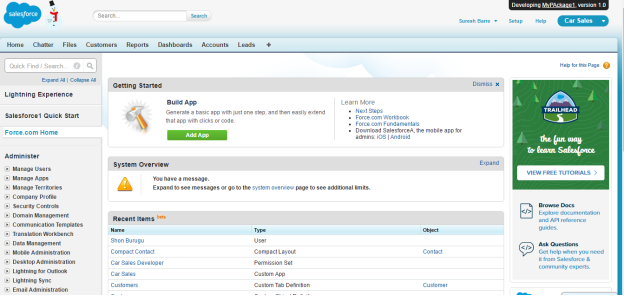 Dashboard
Dashboard
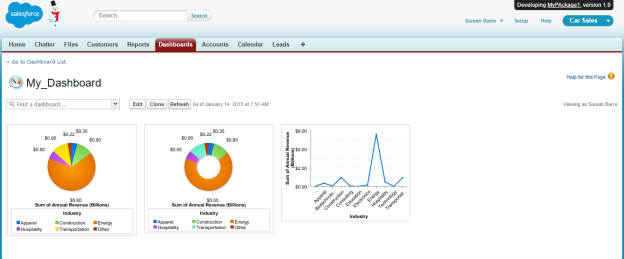
Reports
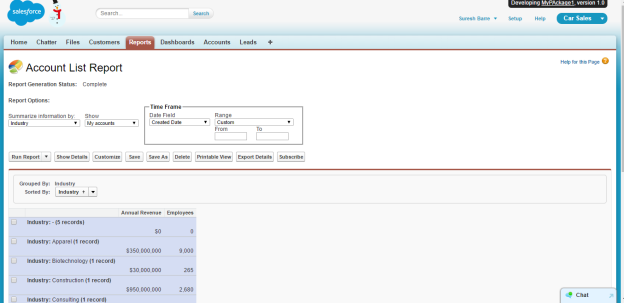
Accounts creation
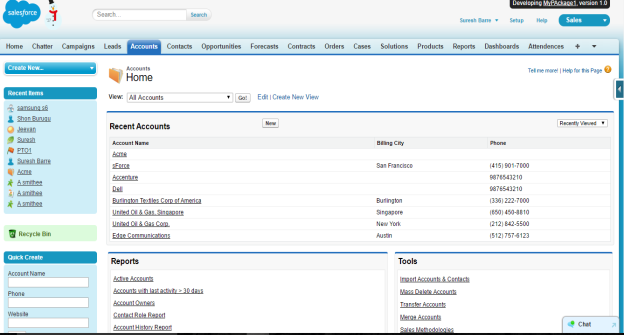
Forecast
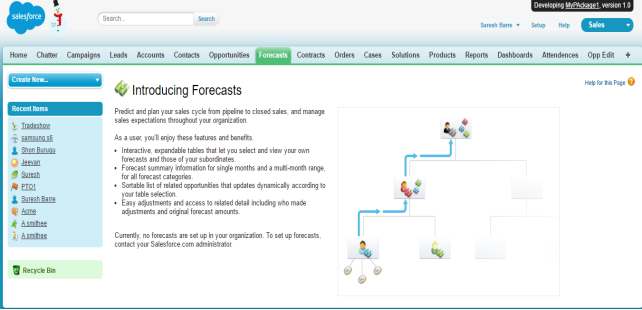
6.0 Learning experience
Internship is a way to show you if that is the career is you really want. And have first hand experience on what you’re going to do, if you choose the trade.
This is an option to “pay your dues” early on. By gaining early experiences as an intern, earn myself a bit more of a leg-up to start.
Internship given me exposure to new and professional situations…with a safety net. They had given me real opportunities for practical application of skill, but are also there to catch me if there is a problem along the way. They provide you experience with a chance to grow. You just don’t stop after some years in the trade. The open-minded mentality, I’ve experienced, can differentiate successful, progressive professionals from the rest.
My learning focus and implementing contribution for the project:
Creating Workflow Rules: To automate organization’s standard processes by configuring workflow rules.
Every single workflow rule consists of: A criteria which determines when the software salesforce executes the workflow rule. And also any changes that causes any record to match this can trigger the workflow rule-it even changes it to hidden fields.
The actions immediately to take, when this workflow rule executes. For an example, the software Salesforce sends automatically an email that notifies the opportunity team when a new high-value opportunity is created.
There are Time-dependent actions which the Salesforce software queues when the workflow rule executes.
Creating Page layouts and Field level security:
Field-Level Security
- It restricts users to edit files and also view them by any means, which includes reports and search results, list views and related lists and email and also mail merge templates, with custom links, connect offline to the API and when also synchronizing data or importing personal data.
- It overrides any weak restrictive field access settings in the pages layouts and also mini page layout.
For an example, if the field is required and read only in the page layout in the field level security settings, it overrides the page layout and the field will be read only for the user.
- It overrides low restrictive field settings in layouts of search.
For example, if a field is visible in the search layout but hidden for certain users via the field-level security settings, the field-level security overrides the search layout and the field will be hidden for those users.
For an example, if it is any field, which is visble
Page Layouts
- It controls the layout, organization of detail and edit pages , related lists, which fields, custom link users see on detail and edit pages only. And also control standard and custom buttons display on detail pages as well as related lists.
- Page layout will determine whether fields are visible, read only, or required, on detail and edit pages only.
- In Personal category , by going into Contact Manager, and to Group, and Professional Editions, and to control which fields users can access in related lists, and to list views, reports, and to Connect Offline, and to email and mail merge templates, and to custom links, and when synchronizing data or importing personal data.
- In Professional category, by going into Enterprise, and to Unlimited, Performance, and Developer Editions, and to determine some aspects of mini page layouts, including record type and profile associations, related lists, fields, and field access settings. The visible fields and related lists of the mini page layout can be further customized, but the other items inherited from the associated page layout cannot be changed on the mini page layout itself. Mini page layouts display selected fields and related lists of records in the mini view of the console.
- It Should not be used to secure data, if we take an example, by removing the Edit button from a page layout, it doesn’t prevent users from using inline editing to modify the already established or any records. And to prevent the users from editing data, it uses any number of combination of sharing rules, field-level security, page layout field properties, validation rules, object permissions, and Visualforce pages.
Sandbox Testing:
Sandboxes create copies of your organization in separate environments. Use them for development, testing, and training, without compromising the data and applications in your Salesforce production organization.
Sandbox Types:
Developer Sandbox
These sandboxes are meant for using coding and testing to be in an isolated environment. These include production organizations configuration which is also known as metadata.
Developer Pro Sandbox
These are the sandboxes that are intended for developing and testing in the isolated environment. These include the metadata of the organization. These have more storage than developers sandboxes. This allows for more robust test data sets and enables the environment to handle development testing more.
Partial Copy Sandbox
These are intended for using as testing environments. These can be used for testing tasks like user acceptance testing, training and integration testing. These include metadata configuration, your production data as defined by this sandbox templates.
Full Sandbox
These sandboxes are intended to be used as testing environment. Only sandboxes support performance testing and load testing and staging. These are a replica of your production organization. This includes all data including metadata. Refresh interval length makes it difficult to use full sandboxes for development.
When you create a Full sandbox, you also have to decide how much field tracking history and Chatter activity to include.
The default is to omit field tracking, but you can include up to 180 days of field tracking. Specify fewer days to avoid generating an excessive amount of data if you track field history for many objects in your production organization.
Chatter activity data can be extensive, which can add a significant amount of time to your Full sandbox copy.
Validation Rules
- Validation rules verify that the data a user enters in a record meets the standards you specify before the user can save the record.
- A validation rule can contain a formula or expression that evaluates the data in one or more fields and returns a value of “True” or “False”.
- Validation rules also include an error message to display to the user when the rule returns a value of “True” due to an invalid value.
- Salesforce runs validation rules before creating records submitted via Web-to-Lead and Web-to-Case, and only creates records that have valid values.
- Validation rules continue to run on individual records if the owner is changed. If the Mass Transfer tool is used to change the ownership of multiple records, however, validation rules won’t run on those records.
Workflow Rules and Approvals:
Each workflow rule consists of: The criteria that determines salesforce executes the workflow rule. And any change that causes the record to match the criteria triggers the workflow rule- it even changes to hidden fields.
Workflow automates some types of actions which are as:
Email Alerts-Send an email to one or more recipients. It can automatically send the sales management an email alert where the sales representative qualifies a large deal.
Tasks-Assign a new task to a user, role, or record owner. It can automatically assign follow-up tasks to a support representative one week after a case is updated.
Field Updates-This Updates the value of a field on a record. This will automatically change the Owner field on a contract 3 days before it expires.
Flow Triggers-It Triggers an auto launched flow. It triggers the wrokflow actions, which are formerly available in a pilot programme, are superseded by using the process builder.
Outbound Messages- this sends a secure configurable API message to a designated listener. For an example, this will automatically initiate a reimbursement process for the approved expense report after triggering an outbound API message to the external HR system.
Approvals
This is an automated process where the organization can use to approve salesforce records. This process explains in detail the steps necessary for the record, for the approval and also decides who has to approve it at each step. These steps can apply to each record in the process or certain defined by the administrator. It also specifies for any action taken in the records for approval.
Apex code:
                      Apex is an object-oriented programming language which allows developers to execute flow and transaction control statements on the Force.com server. It uses syntax that almost looks like java and this also acts like database stored procedures. Apex also enables developers for adding business logics and visualforce pages. This code can be started by web service requests and also from triggers on objects.
Apex is: Integrated, Easy to use, Data focused, Rigorous, Hosted, Multitenant aware, automatically upgradeable, easy to test, Versioned.
Visualforce
Visualforce is a framework which allows developers to build fully sophisticated, custom UI’s that can be hosted nativly on the Force.com platform. The Visualforce framework includes a tag-based markup language, similar to HTML, and a set of server-side “standard controllers” that make basic database operations, such as queries and saves, very simple to perform.
In the Visualforce markup language, every Visualforce tag relates to a coarse or fine-grained UI component, such as a section of a page, a related list, or a field. The behavior of Visualforce components can either be controlled by the same logic that is used in standard Salesforce pages, or developers can relate their own logic with a controller class written in Apex.
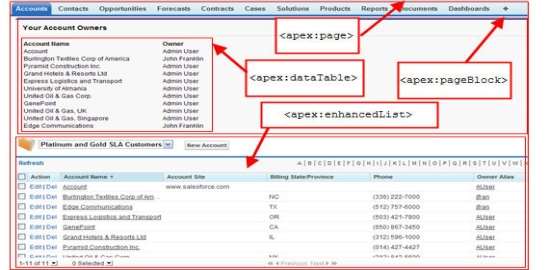
Visualforce page definition consists of two primary elements:
Visualforce markup
HTML, JavaScript, or any other Web-enabled code are tagged by visual embedded within a single <apex:page>tag. It defines user interface markup of components are to be included on the page, and they should appear the way they should.
A Visualforce controller
It is a set of procedural instructions that specifically tells what happens when the user starts to interact with the specified components in associated Visualforce markup, such as when a button or a link is clicked. They also provide access to data which should be displayed and can modify component behavior.
A developer can use standard controller provided by the Force.com platform, or add some custom controller logic by using a class which is written in Apex:
A standard controller which consists of the same functionality and logic used for a usually standard Salesforce page. For an example, if we use some standard Accounts controller, by clicking the Save button in the Visualforce page which results in the similar behavior by clicking Save on a standard Account edit page.
Triggers
Apex can be started through the use of triggers. A trigger is an Apex code which executes before or after the following types of operations:
- insert
- merge
- upsert
- upload
- delete
- undelete
Relationship between the internship and my field of studies
A primary objective of internship is “to provide students with an opportunity to test abilities and attitudes toward particular material or career possibilities for the future”
For me classroom learning is important, but it does not provide me with real work experience to prepare me for a career after graduation. Exposure to the workplace environment is needed to bridge the gap between learning in the classroom and application in the work environment.
Since I am doing MBA with Management Information Systems as my concentration, it is a great opportunity to get real time work exposure in multi-faceted environment.
Salesforce objects and relationships
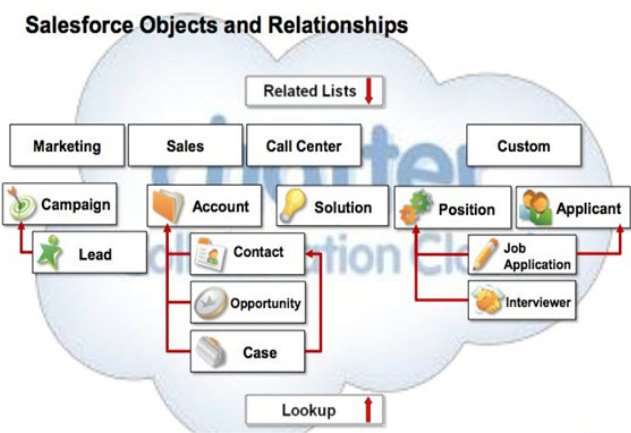
Salesforce Development Life Cycle Stages
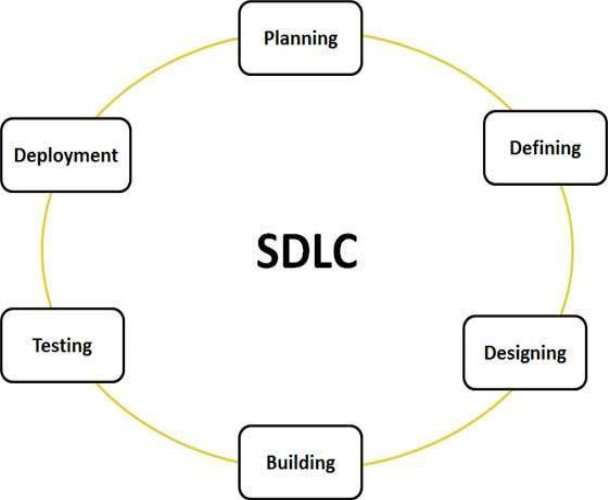
7.0 CONCLUSION
In review the internship that I have been to work is an excellent and rewarding experience. I was fortunate to meet and work with many people that I am sure will be able to help me with opportunities in the future.
The things I have learned from this internship are time management skills and self-motivation as well as work discipline. I never thought I could work eight hours straight everyday for five days in a week. When I realized that I planned my day and work ahead so I don’t waste any of my working hours. I made myself to be ready with all the doubts, when it was the correct time to get feedback. This internship motivated me through work in the office continuously for many hours. I also suggested my share of ideas and proposed some proposals that the company is looking forward into using.
In conclusion, the internship is an useful experience, I have find out what my strengths and weakness are; I gaining new knowledge and skills and met many new people, I am achieving many of my learning goals, however for some the conditions did not permit to achieve them as I wanted.
This Internship is giving me new insights and motivation to pursue a career as a salesforce developer. To prepare myself for my future career I can improve several things. I can work on my communication skills so that I am able to present and express myself more confidently.
8.0 APPENDICES
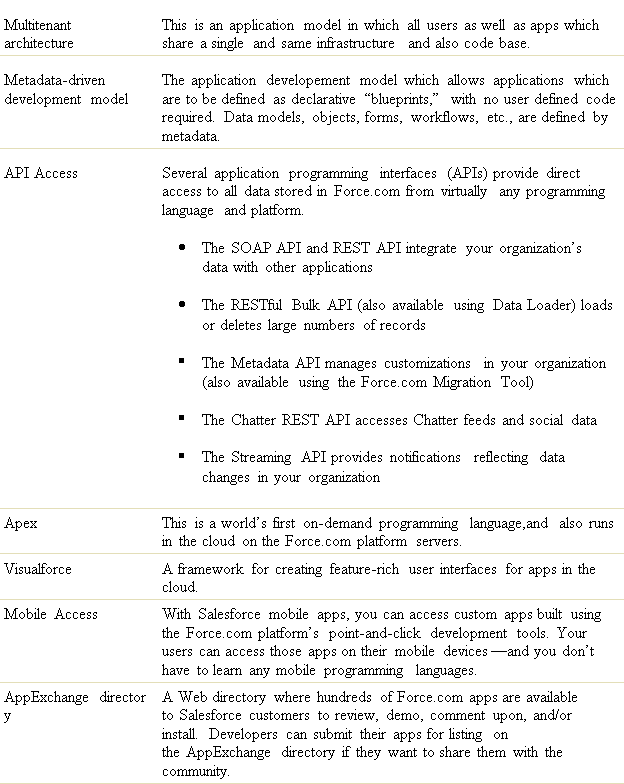
THANK YOU
******************************************************************